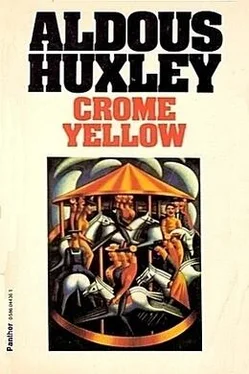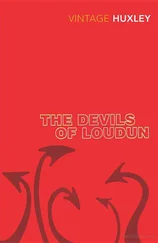"May I come in?" she asked.
"Certainly."
She skipped up the remaining two rungs and was over the threshold in an instant. "A letter came for you by the second post," she said. "I thought it might be important, so I brought it out to you." Her eyes, her childish face were luminously candid as she handed him the letter. There had never been a flimsier pretext.
Gombauld looked at the envelope and put it in his pocket unopened. "Luckily," he said, "it isn't at all important. Thanks very much all the same."
There was a silence; Mary felt a little uncomfortable. "May I have a look at what you've been painting?" she had the courage to say at last.
Gombauld had only half smoked his cigarette; in any case he wouldn't begin work again till he had finished. He would give her the five minutes that separated him from the bitter end. "This is the best place to see it from," he said.
Mary looked at the picture for some time without saying anything. Indeed, she didn't know what to say; she was taken aback, she was at a loss. She had expected a cubist masterpiece, and here was a picture of a man and a horse, not only recognisable as such, but even aggressively in drawing. Trompe–l'oeil—there was no other word to describe the delineation of that foreshortened figure under the trampling feet of the horse. What was she to think, what was she to say? Her orientations were gone. One could admire representationalism in the Old Masters. Obviously. But in a modern…? At eighteen she might have done so. But now, after five years of schooling among the best judges, her instinctive reaction to a contemporary piece of representation was contempt—an outburst of laughing disparagement. What could Gombauld be up to? She had felt so safe in admiring his work before. But now—she didn't know what to think. It was very difficult, very difficult.
"There's rather a lot of chiaroscuro, isn't there?" she ventured at last, and inwardly congratulated herself on having found a critical formula so gentle and at the same time so penetrating.
"There is," Gombauld agreed.
Mary was pleased; he accepted her criticism; it was a serious discussion. She put her head on one side and screwed up her eyes. "I think it's awfully fine," she said. "But of course it's a little too…too…trompe–l'oeil for my taste." She looked at Gombauld, who made no response, but continued to smoke, gazing meditatively all the time at his picture. Mary went on gaspingly. "When I was in Paris this spring I saw a lot of Tschuplitski. I admire his work so tremendously. Of course, it's frightfully abstract now—frightfully abstract and frightfully intellectual. He just throws a few oblongs on to his canvas—quite flat, you know, and painted in pure primary colours. But his design is wonderful. He's getting more and more abstract every day. He'd given up the third dimension when I was there and was just thinking of giving up the second. Soon, he says, there'll be just the blank canvas. That's the logical conclusion. Complete abstraction. Painting's finished; he's finishing it. When he's reached pure abstraction he's going to take up architecture. He says it's more intellectual than painting. Do you agree?" she asked, with a final gasp.
Gombauld dropped his cigarette end and trod on it. "Tschuplitski's finished painting," he said. "I've finished my cigarette. But I'm going on painting." And, advancing towards her, he put his arm round her shoulders and turned her round, away from the picture.
Mary looked up at him; her hair swung back, a soundless bell of gold. Her eyes were serene; she smiled. So the moment had come. His arm was round her. He moved slowly, almost imperceptibly, and she moved with him. It was a peripatetic embracement. "Do you agree with him?" she repeated. The moment might have come, but she would not cease to be intellectual, serious.
"I don't know. I shall have to think about it." Gombauld loosened his embrace, his hand dropped from her shoulder. "Be careful going down the ladder," he added solicitously.
Mary looked round, startled. They were in front of the open door. She remained standing there for a moment in bewilderment. The hand that had rested on her shoulder made itself felt lower down her back; it administered three or four kindly little smacks. Replying automatically to its stimulus, she moved forward.
"Be careful going down the ladder," said Gombauld once more.
She was careful. The door closed behind her and she was alone in the little green close. She walked slowly back through the farmyard; she was pensive.
Henry Wimbush brought down with him to dinner a budget of printed sheets loosely bound together in a cardboard portfolio.
"To–day," he said, exhibiting it with a certain solemnity, "to–day I have finished the printing of my 'History of Crome'. I helped to set up the type of the last page this evening."
"The famous History?" cried Anne. The writing and the printing of this Magnum Opus had been going on as long as she could remember. All her childhood long Uncle Henry's History had been a vague and fabulous thing, often heard of and never seen.
"It has taken me nearly thirty years," said Mr. Wimbush. "Twenty–five years of writing and nearly four of printing. And now it's finished—the whole chronicle, from Sir Ferdinando Lapith's birth to the death of my father William Wimbush—more than three centuries and a half: a history of Crome, written at Crome, and printed at Crome by my own press."
"Shall we be allowed to read it now it's finished?" asked Denis.
Mr. Wimbush nodded. "Certainly," he said. "And I hope you will not find it uninteresting," he added modestly. "Our muniment room is particularly rich in ancient records, and I have some genuinely new light to throw on the introduction of the three–pronged fork."
"And the people?" asked Gombauld. "Sir Ferdinando and the rest of them—were they amusing? Were there any crimes or tragedies in the family?"
"Let me see," Henry Wimbush rubbed his chin thoughtfully. "I can only think of two suicides, one violent death, four or perhaps five broken hearts, and half a dozen little blots on the scutcheon in the way of misalliances, seductions, natural children, and the like. No, on the whole, it's a placid and uneventful record."
"The Wimbushes and the Lapiths were always an unadventurous, respectable crew," said Priscilla, with a note of scorn in her voice. "If I were to write my family history now! Why, it would be one long continuous blot from beginning to end." She laughed jovially, and helped herself to another glass of wine.
"If I were to write mine," Mr. Scogan remarked, "it wouldn't exist. After the second generation we Scogans are lost in the mists of antiquity."
"After dinner," said Henry Wimbush, a little piqued by his wife's disparaging comment on the masters of Crome, "I'll read you an episode from my History that will make you admit that even the Lapiths, in their own respectable way, had their tragedies and strange adventures."
"I'm glad to hear it," said Priscilla.
"Glad to hear what?" asked Jenny, emerging suddenly from her private interior world like a cuckoo from a clock. She received an explanation, smiled, nodded, cuckooed at last "I see," and popped back, clapping shut the door behind her.
Dinner was eaten; the party had adjourned to the drawing–room.
"Now," said Henry Wimbush, pulling up a chair to the lamp. He put on his round pince–nez, rimmed with tortoise–shell, and began cautiously to turn over the pages of his loose and still fragmentary book. He found his place at last. "Shall I begin?" he asked, looking up.
"Do," said Priscilla, yawning.
In the midst of an attentive silence Mr. Wimbush gave a little preliminary cough and started to read.
"The infant who was destined to become the fourth baronet of the name of Lapith was born in the year 1740. He was a very small baby, weighing not more than three pounds at birth, but from the first he was sturdy and healthy. In honour of his maternal grandfather, Sir Hercules Occam of Bishop's Occam, he was christened Hercules. His mother, like many other mothers, kept a notebook, in which his progress from month to month was recorded. He walked at ten months, and before his second year was out he had learnt to speak a number of words. At three years he weighed but twenty–four pounds, and at six, though he could read and write perfectly and showed a remarkable aptitude for music, he was no larger and heavier than a well–grown child of two. Meanwhile, his mother had borne two other children, a boy and a girl, one of whom died of croup during infancy, while the other was carried off by smallpox before it reached the age of five. Hercules remained the only surviving child.
Читать дальше











